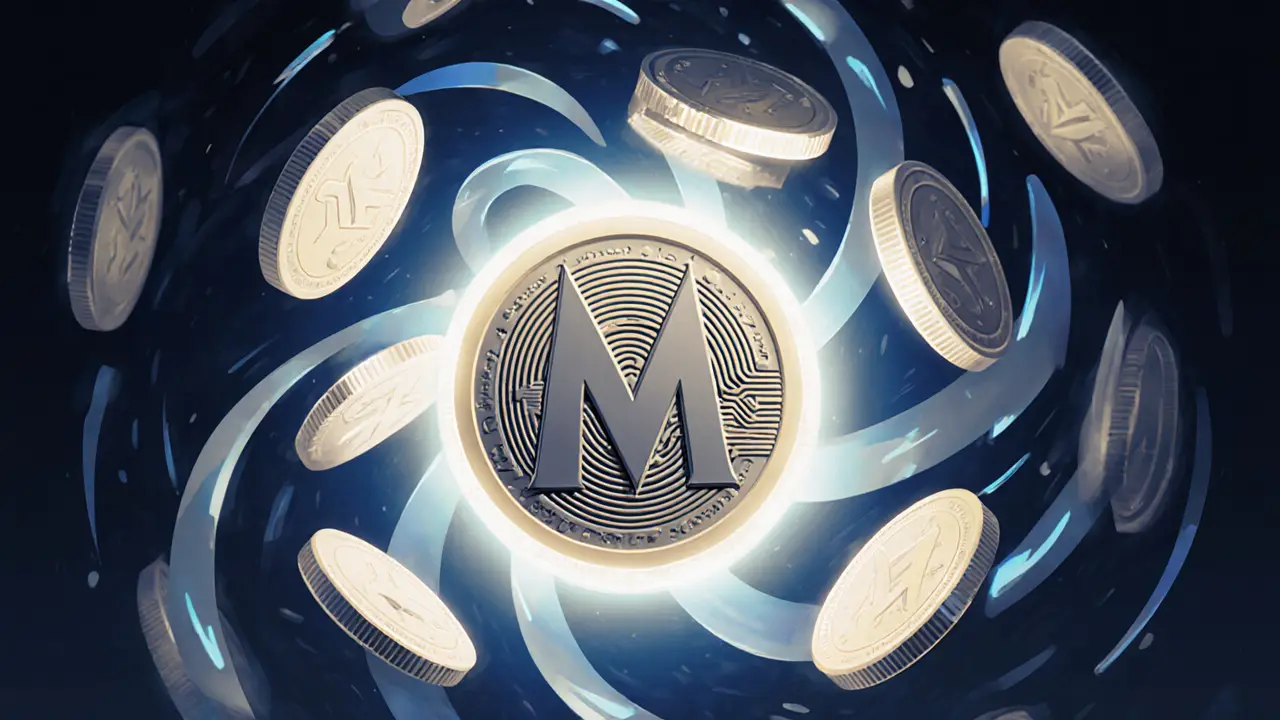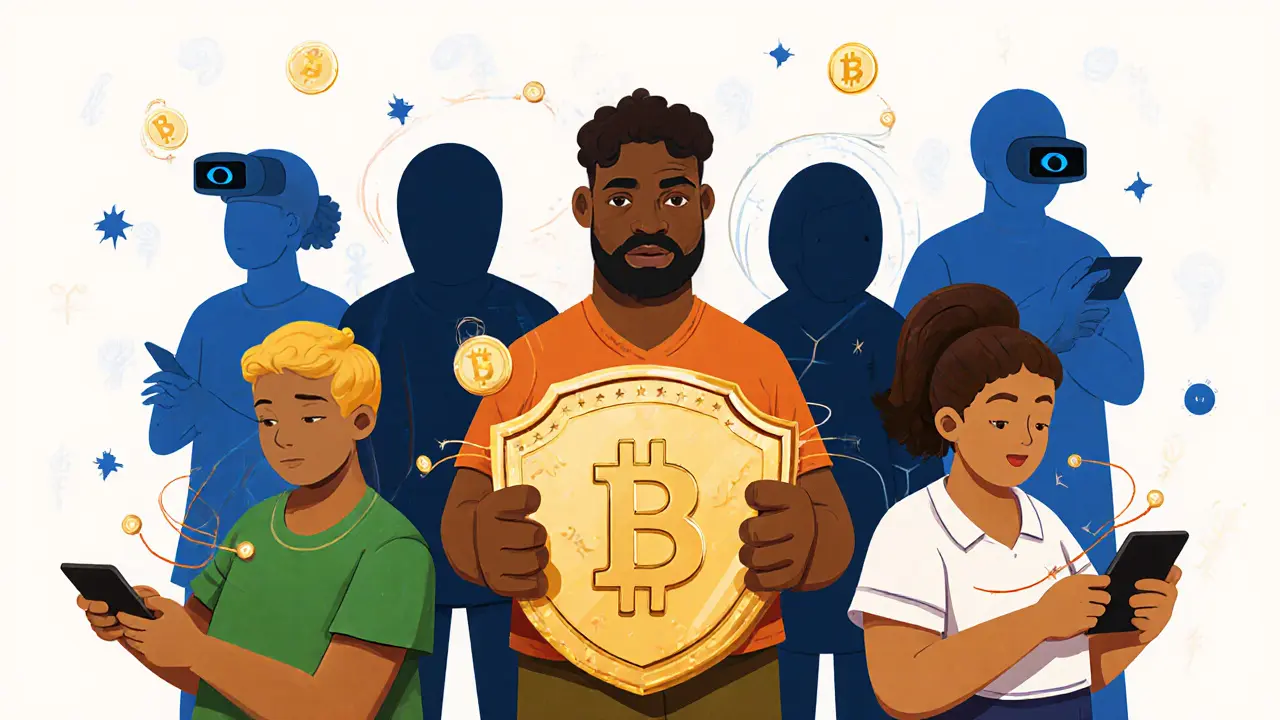What Are Privacy Coins in Cryptocurrency? A Clear Breakdown of How They Work and Why They Matter
 Jan, 21 2025
Jan, 21 2025
Privacy Coin Comparison Tool
Compare Privacy Coins
Compare the key features of Monero, Zcash, and Dash to find the privacy coin that best suits your needs.
Key Features Comparison
| Feature | Monero | Zcash | Dash |
|---|---|---|---|
| Privacy Features | Ring signatures, stealth addresses, confidential transactions | zk-SNARKs (optional shielded transactions) | PrivateSend mixing |
| Transaction Speed | Slow (5-10 minutes) | Moderate (1-3 minutes) | Fast (1-2 minutes) |
| Transaction Size | Large (13.2 KB) | Medium (2-4 KB) | Small (1-2 KB) |
| Adoption | High (growing daily active addresses) | Moderate (declining adoption) | Low (limited use) |
| Ease of Use | Automatic privacy | Requires user choice (only 2.7% use shielded) | Requires manual mixing |
| Best For | Users prioritizing maximum privacy | Users who want optional privacy | Users who want basic obfuscation |
Which Coin Should You Choose?
Based on your priorities:
Most people think cryptocurrency is anonymous. It’s not. Bitcoin, Ethereum, and nearly all major coins are pseudonymous-your wallet address isn’t tied to your name, but every transaction you ever made is publicly visible on the blockchain. Anyone can track how much you sent, when, and to whom. If someone links your address to your identity-say, through an exchange or a public donation-you’re exposed. That’s where privacy coins come in.
What Exactly Are Privacy Coins?
Privacy coins are cryptocurrencies built to hide transaction details: who sent money, who received it, and how much was transferred. Unlike Bitcoin, where all transaction data is open for anyone to see, privacy coins use advanced cryptography to make transactions untraceable. They’re not about hiding illegal activity-they’re about protecting your financial privacy, just like cash does in the real world. The first real privacy coin was Dash, launched in January 2014. It was originally called Darkcoin, hinting at its purpose. Then came Monero in April 2014, designed from the ground up for privacy. Later, in 2016, Zcash arrived with a completely different approach using zero-knowledge proofs. These three remain the most well-known today.How Do Privacy Coins Actually Work?
Each privacy coin uses different tools to achieve anonymity. Understanding these helps explain why they’re not all the same.Monero: Privacy by Default
Monero is the most private of the major coins. Every single transaction on Monero is private-no exceptions. It uses three key techniques:- Ring signatures: When you send Monero, your transaction is mixed with 10 other random transactions from the blockchain. This creates a group of possible senders, making it impossible to tell which one is real. By default, Monero uses 11 inputs per transaction, meaning there’s a 9% chance any one of them is you.
- Stealth addresses: Every time you receive Monero, a one-time address is created just for that transaction. No one can link multiple payments to your wallet. Even if someone knows your public address, they can’t see your incoming funds.
- Confidential transactions: The amount sent is encrypted. No one can see how much you transferred, not even the network nodes verifying the transaction.
Zcash: Privacy You Can Choose
Zcash takes a different route. It gives you a choice: transparent or shielded transactions. Transparent ones work like Bitcoin-public and trackable. Shielded ones use something called zk-SNARKs, a type of zero-knowledge proof that lets the network verify a transaction without seeing any details. Here’s the catch: only 2.7% of Zcash transactions use shielded addresses as of late 2023. Most users don’t bother, meaning the majority of Zcash activity is just as visible as Bitcoin. Zcash’s privacy is optional, and that’s its biggest weakness. If you forget to use shielded addresses, your history is out there.Dash: Mixing for Obscurity
Dash uses a system called PrivateSend, which is based on CoinJoin. It mixes your coins with others’ in batches of 5 to 15 participants. This breaks the direct link between sender and receiver. But PrivateSend isn’t as strong as Monero’s. Chainalysis found in 2020 that sophisticated analysis can still trace some Dash transactions, especially if the mixing pool is small or if you transact frequently. Dash is more about obfuscation than true anonymity.
Why Do Privacy Coins Face So Much Pushback?
Privacy coins are controversial-not because they’re inherently bad, but because they make it harder for authorities to track illegal activity. Chainalysis reported in 2022 that privacy coins were used in $487 million in illicit transactions. That sounds scary, but it’s only 1.7% of all cryptocurrency crime. Meanwhile, over 68% of privacy coin usage happens in countries with strict financial controls-places like Venezuela, Iran, and Nigeria-where people use them to protect savings from inflation or government seizure. The Electronic Frontier Foundation (EFF) argues that financial privacy is a civil right. Journalists in authoritarian regimes, whistleblowers, and people fleeing abusive relationships have all used privacy coins to move money safely. Privacy Rights Clearinghouse documented 142 cases in 2022 where privacy coins helped journalists transfer funds without detection. Still, regulators are nervous. Japan banned privacy coins in 2018. South Korea followed. Binance delisted Monero in Canada and Europe in 2020-2021. The U.S. Treasury labeled privacy coins a “growing challenge” in its 2023 National Strategy. Forty-seven percent of U.S.-based exchanges have voluntarily removed them due to legal uncertainty.Are Privacy Coins Still Growing?
Despite the pressure, adoption isn’t dying-it’s shifting. Monero’s daily active addresses grew by 31.4% between January 2021 and October 2023, from 18,500 to 24,300. Zcash, by contrast, saw a 28.1% decline in active users during the same period. Why? Because Monero’s privacy is automatic. Zcash’s is optional-and most users don’t bother. In Venezuela, where inflation hit 500% in 2023, a 2023 survey by the Freedom Foundation found 63% of crypto users prefer privacy coins for daily transactions. Why? Because if your wallet history shows you bought food or medicine, merchants might charge you more. Privacy coins prevent that kind of discrimination. Technically, Monero keeps improving. In 2020, it introduced CLSAG signatures, cutting transaction sizes by 25%. Now, the Monero Research Lab is working on Triptych-a new ring signature protocol that could shrink transactions by 90% while keeping them fully private. If it launches in 2024 as planned, Monero will become faster and cheaper without sacrificing privacy. Zcash also upgraded in 2022 with Halo 2, making shielded transactions 20 times faster. But adoption hasn’t followed.
What’s the Future of Privacy Coins?
The rise of central bank digital currencies (CBDCs)-government-controlled digital money-could be the biggest driver for privacy coins. If your daily spending is tracked, taxed, and controlled by the state, people will look for alternatives. A 2023 study by the National Bureau of Economic Research predicted privacy coins will act as a counterbalance to state surveillance. Delphi Digital projects the total market cap of privacy coins could hit $15 billion by 2027, up from $2.8 billion in late 2023. That’s over 400% growth. But it depends on whether regulators can find a middle ground. Right now, privacy coins exist in a gray zone. They’re not illegal, but they’re heavily restricted. Exchanges avoid them. Wallets don’t always support them. And if you use them, you might raise flags. But here’s the truth: financial privacy isn’t about hiding crime. It’s about protecting people. Just like you don’t want strangers reading your bank statements, you shouldn’t have to worry about your crypto history being tracked by advertisers, insurers, or governments. Privacy coins aren’t perfect. They’re complex, slower, and misunderstood. But they’re the only digital money that truly behaves like cash.Should You Use Privacy Coins?
If you care about your financial privacy and understand the risks, yes.- Use Monero if you want total, automatic privacy. It’s the most secure.
- Use Zcash only if you’re disciplined about always using shielded addresses.
- Avoid Dash if privacy is your main goal-it’s the weakest of the three.
Are privacy coins illegal?
No, privacy coins are not illegal in most countries. However, some governments have banned or restricted them. Japan and South Korea have fully prohibited exchanges from listing them. In the U.S., they’re not banned, but many exchanges voluntarily delist them due to regulatory pressure. Using them for legal purposes-like protecting your financial data-is not against the law.
Can I buy privacy coins on Coinbase or Binance?
Most major centralized exchanges like Coinbase and Binance no longer list Monero or other privacy coins due to regulatory concerns. Binance removed Monero from its Canadian and European platforms in 2020-2021. You can still buy privacy coins on decentralized exchanges (DEXs) like Uniswap or through peer-to-peer platforms like LocalMonero.
Is Monero really untraceable?
Yes, as of 2025, no known technology can trace a properly conducted Monero transaction. Its ring signatures, stealth addresses, and confidential transactions work together to make sender, receiver, and amount invisible. Even researchers with access to the full blockchain cannot determine where funds came from or went to. MIT’s Digital Currency Initiative confirmed this in 2022.
Why is Zcash less private than Monero?
Zcash gives users the choice between transparent and shielded transactions. Over 97% of Zcash transactions are transparent, meaning they’re fully visible on the blockchain like Bitcoin. Only if you actively choose shielded addresses do you get privacy-and most people don’t. Monero, by contrast, makes privacy mandatory for every transaction.
Do privacy coins have real uses beyond crime?
Absolutely. Journalists in authoritarian countries use them to receive donations safely. People in hyperinflation economies like Venezuela use them to avoid price discrimination based on wallet history. Activists, whistleblowers, and even ordinary users want to keep their medical purchases, political donations, or religious contributions private. Financial privacy is a human right, not a tool for criminals.
Will privacy coins survive government crackdowns?
Yes, but they’ll likely move underground. Centralized exchanges may keep delisting them, but decentralized networks and peer-to-peer trading will keep them alive. As central bank digital currencies (CBDCs) roll out with built-in surveillance, demand for private alternatives will grow. Privacy coins aren’t going away-they’re becoming more important.
Michael Fitzgibbon
November 26, 2025 AT 05:32It's wild how people act like privacy is the same as secrecy. I get why regulators freak out, but if your entire financial life is visible to anyone with a browser, that’s not freedom-that’s exposure. I used Monero last year to send money to a friend in Nigeria without her bank freezing the transaction. No drama, no questions asked. Just… money moving like it should.
Komal Choudhary
November 26, 2025 AT 06:34OMG I JUST BOUGHT MONERO TODAY LOL I WAS SO SCARED BUT THEN I READ THIS AND WAS LIKE OH WAIT THIS IS JUST LIKE CASH?? I’M SO HERE FOR IT 💸
priyanka subbaraj
November 26, 2025 AT 11:10You people are naive. Monero isn’t privacy-it’s a magnet for scammers, hackers, and cartel money. You think you’re protecting yourself? You’re just enabling chaos. And don’t even get me started on Zcash-97% transparent? That’s not privacy, that’s performance art.
George Kakosouris
November 26, 2025 AT 12:37Let’s cut through the crypto-washing here. Monero’s ring signatures add O(n²) computational overhead-each transaction scales poorly. Confidential transactions obscure amounts, but they’re still vulnerable to statistical correlation attacks if you’re not using proper key rotation. And let’s not forget: zk-SNARKs in Zcash rely on trusted setup parameters-those aren’t theoretically secure, they’re computationally bound. The EFF’s moral framing ignores the systemic risk this introduces to AML frameworks. This isn’t civil rights-it’s regulatory arbitrage dressed up as liberation.
Ben Costlee
November 28, 2025 AT 06:53I’ve been in this space since 2015. I’ve seen people lose everything because their Bitcoin history showed they bought a gun, or donated to a protest, or paid for therapy. Privacy isn’t about hiding crime-it’s about hiding the fact that you’re human. Monero doesn’t make you a criminal. Surveillance does. I’ve helped five friends set up Monero wallets this year alone. One was a nurse in Texas who didn’t want her employer knowing she was funding her sister’s gender-affirming care. That’s not illegal. That’s just… life.
ola frank
November 29, 2025 AT 15:27The ontological foundation of privacy coins rests on a misalignment between cryptographic anonymity and socio-legal accountability. While Monero’s implementation of ring signatures and stealth addresses achieves computational indistinguishability, the epistemic asymmetry it creates-where transactional intent is obfuscated but not anonymized-introduces a paradox: the system preserves confidentiality at the cost of verifiable legitimacy. This is not a technical failure, but a structural tension inherent in decentralized trust models. The regulatory backlash is not irrational-it is a necessary corrective to the erosion of auditability in financial ecosystems. The question is not whether privacy is desirable, but whether it can coexist with the minimal conditions of social contract enforcement.
imoleayo adebiyi
November 30, 2025 AT 20:53Back home in Lagos, people use Monero to buy fuel when the naira crashes. No one asks where the money came from. No one needs to. It’s not about crime-it’s about survival. This article got it right: privacy is just cash in digital form. I wish more people here could use it without fear. Thanks for writing this.